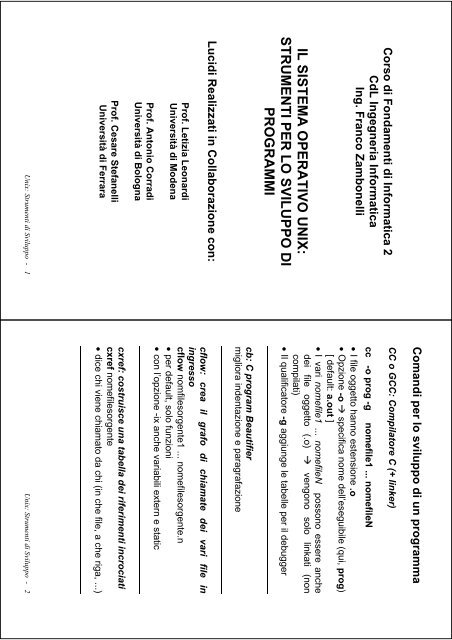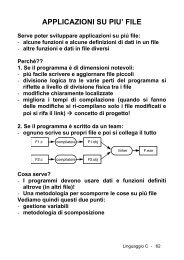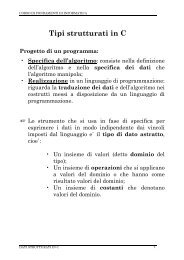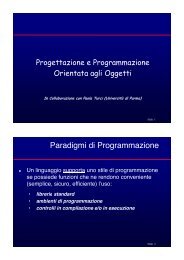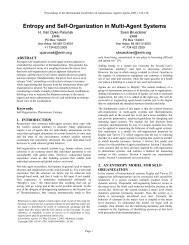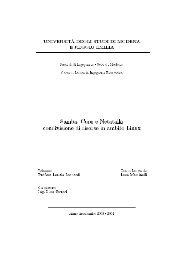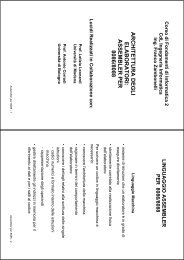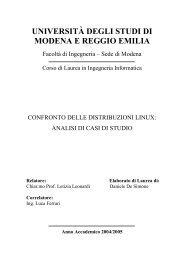Strumenti di Sviluppo Programmi in UNIX
Strumenti di Sviluppo Programmi in UNIX
Strumenti di Sviluppo Programmi in UNIX
Create successful ePaper yourself
Turn your PDF publications into a flip-book with our unique Google optimized e-Paper software.
Corso <strong>di</strong> Fondamenti <strong>di</strong> Informatica 2CdL Ingegneria InformaticaIng. Franco ZambonelliIL SISTEMA OPERATIVO <strong>UNIX</strong>:STRUMENTI PER LO SVILUPPO DIPROGRAMMILuci<strong>di</strong> Realizzati <strong>in</strong> Collaborazione con:Prof. Letizia Leonar<strong>di</strong>Università <strong>di</strong> ModenaProf. Antonio Corra<strong>di</strong>Università <strong>di</strong> BolognaProf. Cesare StefanelliUniversità <strong>di</strong> FerraraUnix: <strong>Strumenti</strong> <strong>di</strong> <strong>Sviluppo</strong> - 1Coman<strong>di</strong> per lo sviluppo <strong>di</strong> un programmaCC o GCC: Compilatore C (+ l<strong>in</strong>ker)cc -o prog -g nomefile1 ... nomefileN• I file oggetto hanno estensione .o• Opzione -o specifica nome dell’eseguibile (qui, prog)[ default: a.out ]• I vari nomefile1 ... nomefileN possono essere anchedei file oggetto (.o) vengono solo l<strong>in</strong>kati (noncompilati)• Il qualificatore -g aggiunge le tabelle per il debuggercb: C program Beautifiermigliora <strong>in</strong>dentazione e paragrafazionecflow: crea il grafo <strong>di</strong> chiamate dei vari file <strong>in</strong><strong>in</strong>gressocflow nomfilesorgente1 ... nomefilesorgente.n• per default, solo funzioni• con l’opzione -ix anche variabili extern e staticcxref: costruisce una tabella dei riferimenti <strong>in</strong>crociaticxref nomefilesorgente• <strong>di</strong>ce chi viene chiamato da chi (<strong>in</strong> che file, a che riga, ...)Unix: <strong>Strumenti</strong> <strong>di</strong> <strong>Sviluppo</strong> - 2
un argomenti { <strong>in</strong>izia l’ esecuzione }stop at l<strong>in</strong>eastop if con<strong>di</strong>zione { ad es. sul valore <strong>di</strong> una variabile }stop <strong>in</strong> proc { varie forme <strong>di</strong> breakpo<strong>in</strong>t }cont { cont<strong>in</strong>ua f<strong>in</strong>o al prossimo breakpo<strong>in</strong>t }step n { trace <strong>in</strong>to, esegue n l<strong>in</strong>ee per volta (def.1)ctrace: controlla l’esecuzione(attenzione: mo<strong>di</strong>fica il file sorgente)Uso suggerito:ctrace sorgente.c > temp.c {un file per volta}cc temp.c { uscita <strong>di</strong> default su a.out }a.out { esecuzione controllata }dbx: Debugger SimbolicoI file eseguibili devono essere stati prodotti conl'opzione -g dal compilatore cc o gcc.Coman<strong>di</strong> per la mo<strong>di</strong>fica:list l<strong>in</strong>eaIniziale, l<strong>in</strong>eaF<strong>in</strong>alee<strong>di</strong>t nomeFilee<strong>di</strong>t nomeFunzionefunc nomeFunzione {<strong>di</strong>chiara la funzione corrente}Si possono analizzare e variare i dati:<strong>di</strong>splay espressioneconvariabili (watch delTurboC)un<strong>di</strong>splay espressioneconvariabiliwhatis identificatore { dà il tipo della variabile }which identificatore { dà <strong>in</strong><strong>di</strong>cazioni sulla variabilecorrentemente specificata }whereis identificatore { fornisce <strong>in</strong><strong>di</strong>cazioni relative avariabili o entità con quel nome}dump funzione { stampa i valori ed i parametridella funzione stessa, se attiva }Unix: <strong>Strumenti</strong> <strong>di</strong> <strong>Sviluppo</strong> - 3Esecuzione controllata:}next n { step over, idem come sopra}Ad esempio, per partire:stop <strong>in</strong> ma<strong>in</strong>runMAKE, il correlatore <strong>di</strong> strumentiIl make gestisce <strong>in</strong> modo ‘automatico’ il progetto <strong>di</strong> fileche costituiscono un’applicazioneLo sviluppo <strong>di</strong>venta automatico dopo aver specificato le<strong>di</strong>pendenze fra i fileUnix: <strong>Strumenti</strong> <strong>di</strong> <strong>Sviluppo</strong> - 4


